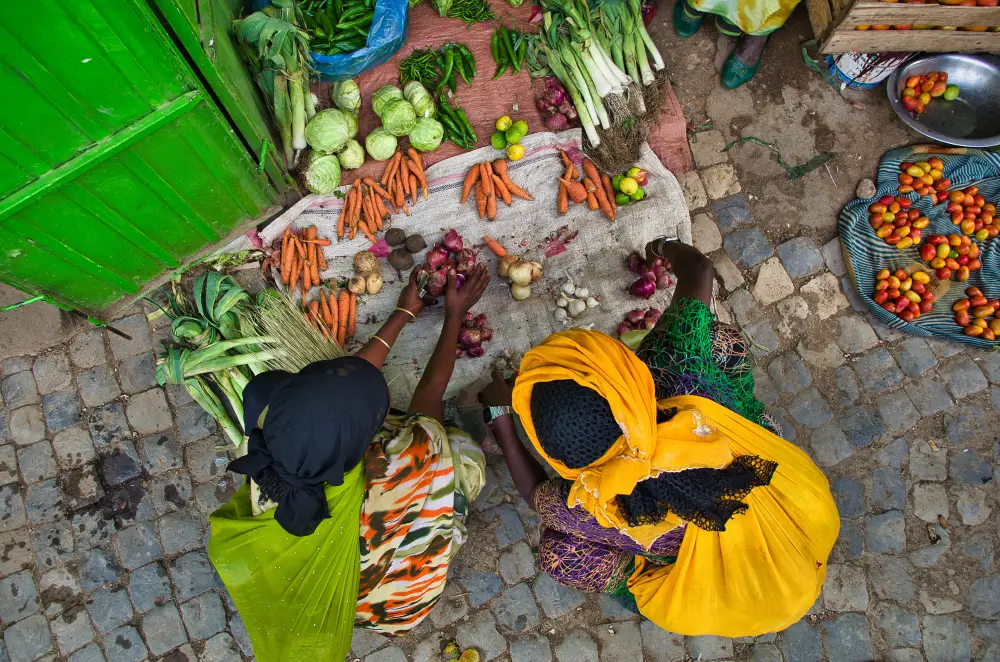
Women in low- and middle-income countries (LMICs) experience malnutrition at disproportionately high rates, a reality shaped not only by poverty, but also by gendered social norms, structural inequalities, and limited agency in food-related decisions. A new study led by NRI PhD researcher Lydia O’Meara offers a robust evidence-based conceptual framework to better understand these dynamics for the design of more effective interventions that improve women’s nutrition.
Published in The Lancet Planetary Health, the study systematically reviewed evidence from 518 studies conducted across 125 LMICs. The research identified 143 determinants that influence women’s food acquisition and dietary intake, spanning eco-social, structural, and individual levels. The result is the first empirically grounded conceptual framework of women’s food environments, a tool that could reshape how researchers, policymakers, and practitioners approach nutrition and food system interventions.
Lead author, O’Meara explained: ‘Sometimes food choices are considered as if they happen in a vacuum, driven by personal preferences and nutrition knowledge. In reality, we found that women’s food environments are complex, and women’s diets are shaped by a web of structural, sociocultural, and financial and physical drivers. Our framework fills a critical gap by explicitly centring women’s agency – their ability to exercise control over food-related decisions, finances, workloads, and mobility – within the wider food environment.’
Why women’s food environments matter
Food environments, the settings in which people make decisions about what to eat, have a direct impact on nutrition, health, and environmental sustainability. But existing frameworks tend to be gender-blind, overlooking the specific ways in which women’s choices and diets are constrained or shaped by cultural expectations, lower social status, caregiving responsibilities, and reduced access to resources.
‘Without integrating a gender lens, well-intentioned nutrition initiatives risk failing to deliver the desired impact,’ said Dr Kate Wellard, who co-authored the study. ‘Addressing the structural and sociocultural realities that shape women’s food environments requires engaging diverse government and societal actors in designing and delivering effective and equitable policies and programmes.’

Agency at the centre
A defining feature of the new framework is its emphasis on women’s agency. Agency is also about the structural and relational conditions that enable or restrict decision-making. The study highlights how women’s agency is shaped by decision-making and financial autonomy, bargaining power, control over time, and freedom of movement.
The framework also considers the influence of climate change, urbanisation, and globalised food systems, which affect the availability, accessibility, and affordability of nutritious foods, particularly in LMIC contexts.
A tool for action
By mapping the determinants of women’s dietary quality, the framework provides a practical tool for diverse stakeholders. Policymakers can use it to design targeted nutrition policies; NGOs can apply it in community-level programming; and researchers can draw on it to develop interventions that address the root causes of poor dietary quality among women.
The authors stress that improving women’s food environments is not just about health, it also has ripple effects for families, communities, and national development goals. Better diets for women contribute to better nutrition for children, reduced healthcare costs, stronger economies, and more sustainable food systems.
O’Meara added: ‘Our hope is that this framework becomes a catalyst for change, a reference point that helps practitioners and policymakers move beyond surface-level solutions. If we tackle the underlying determinants of women’s food agency, the benefits will be felt for generations.’
Looking ahead
The research team hopes the framework will be widely adopted and adapted to different LMIC contexts, acting as a bridge between research evidence and practice. ‘This is just the beginning,’ O’Meara noted. ‘By recognising and addressing the unique challenges women face in their food environments, we can move closer to achieving nutrition equity and global health and sustainable food system goals.’
Read the full study in The Lancet Planetary Health here.

